|
|
|
Sort Order |
|
|
|
Items / Page
|
|
|
|
|
|
|
| Srl | Item |
| 1 |
ID:
106152
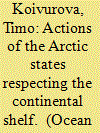

|
|
|
| 2 |
ID:
133845
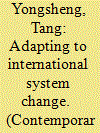

|
|
|
|
|
| Publication |
2014.
|
| Summary/Abstract |
Understanding the transition happening in the international system requires a balance between old logic and new reality. As the power pattern changes and the characteristics of international order unfold, the complications of global politics, casual relationships among different issues, and the echoing effects of strategic choices will lead to greater need for global governance. The logic of simple power politics will not be enough when strategists confront nontraditional challenges.
|
|
|
|
|
|
|
|
|
|
|
|
|
|
|
|
| 3 |
ID:
133777
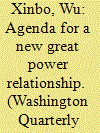

|
|
|
|
|
| Publication |
2014.
|
| Summary/Abstract |
Well begun is half done," Aristotle once said, meaning that beginning a project well makes it easier to do the rest. Yet, this may not be true of China-U.S. relations during Obama's presidency. Although the Obama administration secured a smooth transition from the George W. Bush years and attached high priority to relations with China during its first year in office, bilateral relations turned downward over the rest of Obama's first term, leaving a legacy of growing mutual suspicion and rising competition between the two countries, especially in the Asia-Pacific region. In spite of the November 2009 bilateral agreement to build a "positive, cooperative, and comprehensive relationship,"1 the two sides missed opportunities for more cooperation while mishandling and even misguiding bilateral ties on some points.
|
|
|
|
|
|
|
|
|
|
|
|
|
|
|
|
| 4 |
ID:
095544
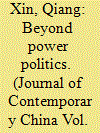

|
|
|
|
|
| Publication |
2010.
|
| Summary/Abstract |
Facing the ever-growing interdependence across the Taiwan Strait, Mainland China's strategy towards Taiwan is undergoing a profound change, that is, transcending the staunch realpolitik mentality and turning to an institutional arrangement in policy making. Especially since President Hu Jintao took up his position, the Mainland has endeavored to improve cross-Strait relations through the institutionalization of a series of sensitive issues, such as the proposals and signatures of some long-term accords aiming to advocate economic cooperation, promote social exchanges, weaken political opposition and foster mutual trust. By taking the Mainland's national development strategy shift, Taiwan's domestic reality and 'institution deficit' in cross-Strait relations into consideration, this paper analyzes the reasons, efforts and features of the Mainland's recent institutional-orientated policy transition.
|
|
|
|
|
|
|
|
|
|
|
|
|
|
|
|
| 5 |
ID:
120517
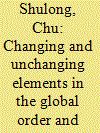

|
|
|
| 6 |
ID:
155807
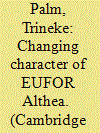

|
|
|
|
|
| Summary/Abstract |
States have different strategic cultures when it comes to legitimating the use of military force and its relation with other foreign policy instruments. However, increasingly, military operations are conducted in multilateral forums; EU military operations are one of the most notable examples of this development. While some claim that these operations reflect power relations between nations with different strategic cultures, others argue that these common missions involve states in a process of collective learning and convergence of interests. Drawing upon an advocacy coalition approach, this paper confronts the competing hypotheses in the case of European Union Force (EUFOR) Althea in Bosnia-Herzegovina (BiH), as the EU’s longest running military operation (since 2004). On the basis of policy documents and semi-structured interviews with policymakers and politicians, this paper concludes that the evolution of EUFOR Althea has been primarily the result of the power politics of different coalitions, but there have also been a few instances of learning.
|
|
|
|
|
|
|
|
|
|
|
|
|
|
|
|
| 7 |
ID:
128994
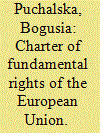

|
|
|
|
|
| Publication |
2014.
|
| Summary/Abstract |
The proclamation of the Charter for Fundamental Rights of the European Union, in December 2000 at Nice, France, followed by its inclusion within the failed Constitutional Treaty and its current status as a legally binding document under the Treaty of Lisbon, charts the changing fortunes of European Union politics dealing with fundamental rights protection. This article outlines the main rationales and hopes behind the enactment of the Charter and notes that through the process of political conditionality it may have been devalued from its very conception. The article suggests that, following their accession, Poland, and later the Czech Republic, used the Charter and Lisbon Treaty negotiations, including their opt-outs from the Charter, to engage in a game of power politics that had both domestic and European undertones. This politics of power game-play reflected a need by both states, and Poland in particular, to respond to both the political conditionality that they had been required to sign up to as part of the accession process and to emphasise how membership had improved their negotiating power. The article suggests that the consequence of this action by both states has not only further devalued the Charter but potentially undermined the rights of Polish and Czech citizens.
|
|
|
|
|
|
|
|
|
|
|
|
|
|
|
|
| 8 |
ID:
057958
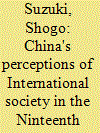

|
|
|
| 9 |
ID:
119132
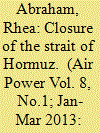

|
|
|
| 10 |
ID:
131459
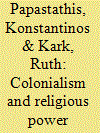

|
|
|
|
|
| Publication |
2014.
|
| Summary/Abstract |
This article critically assesses the conflict within the Orthodox Church of Jerusalem between the Greek hierarchy and the Arab laity concerning the proposals of the Mandatory Government for a new regulatory framework for patriarchal operation. The British presented two draft reform ordinances, neither of which met Arab expectations. Instead of promoting the laity's emancipation from 'foreign' Greek administrative and financial control, the ordinances left little room for a true inversion of the power structure between the two opposing camps, retaining the status quo at the expense of the Arab Orthodox rights.
|
|
|
|
|
|
|
|
|
|
|
|
|
|
|
|
| 11 |
ID:
145147
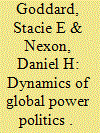

|
|
|
|
|
| Summary/Abstract |
We call for a research program focused on the dynamics of global power politics. Rather than link realpolitik to structural-realist theoretical frameworks or the putatively anarchical character of world politics, the program treats power politics as an object of analysis in its own right. It embraces debate over the nature of global power politics among scholars working with distinctive approaches. It sees the structural contexts of power politics as highly variable and often hierarchical in character. It attenuates ex ante commitments to the centrality of states in global politics. And it takes for granted that actors deploy multiple resources and modalities of power in their pursuit of influence. What binds this diverse research program together is its focus on realpolitik as the politics of collective mobilization in the context of the struggle for influence among political communities, broadly understood. Thus, the study of the dynamics of collective mobilization—the causal and constitutive pathways linking efforts at mobilization with enhanced power—brings together approaches to security studies in a shared study of power politics.
|
|
|
|
|
|
|
|
|
|
|
|
|
|
|
|
| 12 |
ID:
124993
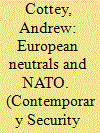

|
|
|
|
|
| Publication |
2013.
|
| Summary/Abstract |
This article provides a comparative analysis of relations between the European neutral states - Austria, Finland, Ireland, Sweden, and Switzerland - and the North Atlantic Treaty Organization (NATO). The European neutrals have established broadly similar partnerships with NATO since the end of the Cold War, but significant variation in their relations with NATO can also be observed (the origins of which can be traced back to the Cold War and earlier). This pattern - continued non-membership of NATO, partnership with the alliance, and significant variation in terms of national relations with NATO - can be explained by a historical institutionalist perspective, combining path dependency and policy adaptation. This perspective also helps to explain why the relationship between the European neutrals is - and is likely to remain - an ambiguous partnership: policy adaptation at the elite level, implying close cooperation with NATO, sits alongside path dependency at the general public level where NATO is still viewed as representing 'public bads' such as power politics, militarism, and nuclear weapons. The deeply embedded domestic path dependency of neutrality suggests that even those states with the closest relations with NATO - Sweden and Finland - may never join the alliance. The article also argues that the neutral states' divergent patterns of engagement with NATO parallel those of NATO members with the alliance: more attention needs to be paid to the different ways in which both partners and members engage with NATO and the reasons for such differences.
|
|
|
|
|
|
|
|
|
|
|
|
|
|
|
|
| 13 |
ID:
028071
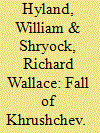

|
|
|
|
|
| Publication |
London, Pitman Publishing, 1970.
|
| Description |
xi, 209p.hbk
|
| Standard Number |
273314300
|
|
|
|
|
|
|
|
|
|
|
|
Copies: C:1/I:0,R:0,Q:0
Circulation
| Accession# | Call# | Current Location | Status | Policy | Location |
| 011542 | 947.0852/HYL 011542 | Main | On Shelf | General | |
|
|
|
|
| 14 |
ID:
133850
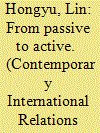

|
|
|
|
|
| Publication |
2014.
|
| Summary/Abstract |
As one of the victorious allies of World War - I, China attended the Paris Peace Conference in 1919. Toa certain extent, the conference can be regarded as the true beginning of global governance. It was followed by the establishment of the Versailles-Washington System. The first international pattern with world participation
|
|
|
|
|
|
|
|
|
|
|
|
|
|
|
|
| 15 |
ID:
130491
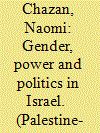

|
|
|
|
|
| Publication |
2011.
|
| Summary/Abstract |
The story of women, politics and power in Israel is fraught with anomalies. Women have traditionally been active participants in the public sphere, but their power has been consistently constrained. They have suffered from systematic underrepresentation, but as their number in the formal political arena has grown, their substantive impact has waned. And while they have scored significant achievements, gender inequality endures. Never have these inherent contradictions been more apparent than during the past decade, when the rising political clout of women has not been translated into sustained power, their increased political presence into effective influence, or their tangible legislative gains into significant socioeconomic progress. These trends highlight not only the ongoing impact of chauvinistic, militaristic and particularistic strains on Israeli politics in general and the depth of the recent move to the right in particular, but also the innovative potential of gender-rooted alternatives
|
|
|
|
|
|
|
|
|
|
|
|
|
|
|
|
| 16 |
ID:
101280
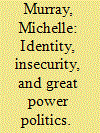

|
|
|
|
|
| Publication |
2010.
|
| Summary/Abstract |
Why did Germany pursue naval expansion at the turn of the twentieth century? This question has long puzzled scholars of international security, who consider German naval ambition to be an instance of suboptimal arming-a decision that decreased Germany's overall security and risked the survival of the German state. This article argues that the social desire to be recognized as a world power guided Germany's decision to challenge British naval hegemony. From the beginning of its naval planning, Germany had one clear aim: a powerful fleet of battleships stationed in the North Sea would alter the political relationship with Britain in such a way that it could no longer ignore Germany's claim to world power status. Reconceptualizing Germany's naval ambition as a struggle for recognition elucidates the contradictions at the center of German naval strategy, explaining how the doomed policy could proceed despite its certain failure. The article concludes that the power-maximizing practices of great powers should be seen as an important component of identity construction and an understudied dimension of contemporary security practice.
|
|
|
|
|
|
|
|
|
|
|
|
|
|
|
|
| 17 |
ID:
107449


|
|
|
| 18 |
ID:
184653


|
|
|
|
|
| Summary/Abstract |
This article investigates the stark variation in elite appraisals of the performance of the International Criminal Court (ICC). Based on an online survey of diplomats posted to the UN headquarters, this article determines which country situations under ICC scrutiny respondents regard as successes or failures and, in turn, what parameters underpin their views. It also asks about negative cases; that is, country situations that never made it to The Hague due to political considerations. This article makes a two-fold contribution to the study of international law and politics. First, it shows that diplomats conceptualize international justice in terms of ongoing prosecutions and convictions obtained. Thus, they downplay indirect effects such as positive complementarity. Interestingly, scholars and diplomats agree on the court’s fiascos, yet dissent on successes. Finally, diplomats have proved tired of political considerations obstructing international justice. Survey data reveals that they want the court to investigate situations involving major powers.
|
|
|
|
|
|
|
|
|
|
|
|
|
|
|
|
| 19 |
ID:
149153
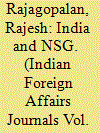

|
|
|
| 20 |
ID:
111772
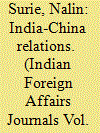

|
|
|
|
|
|
|
|